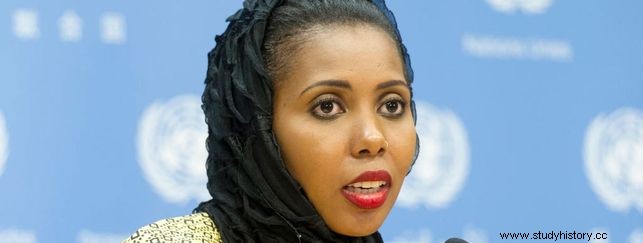Jaha Dukureh (b. 1990) is an active campaigner against female genital mutilation. In 2016, she was named one of the hundred most influential people in the world according to Time 100. In 2017, you voted for her for the Nob'Elle Peace Prize!

Victim of genital mutilation from birth
Jaha Dukureh was born in Gambia, in a family of eight children. Shortly after her birth, she underwent type III female genital mutilation:infibulation. Growing up, Jaha, encouraged by her mother who wants her to become a doctor, is one of the first girls in her family to go to school. She is good at it.
“Some family members would complain because instead of coming home and learning to be a woman, I’d be in talent shows and after-school classes”
(Family members were complaining that instead of going home and learning how to be a woman, I had classes after school)
When she was 14, her mother learned that she had cancer. Jaha accompanies her to the UK where she undergoes treatment; but when she learns that she only has a few months left to live, she sends her daughter back to Gambia so that she does not see her die.
Arranged marriage
Without her mother to encourage her studies, Jaha Dukureh is sent to New York at the age of 15 for an arranged marriage with a man in his forties. During her first sexual relations with her husband, she suffers martyrdom and discovers the genital mutilation of which she was the victim at birth. The surgical treatment she receives is a new ordeal, which she experiences as a new mutilation.
The marriage quickly breaks up and Jaha moves in with relatives. By dint of perseverance, she manages to integrate a school after having been refused in ten others, for lack of a legal guardian.
First speech
At 17, Jaha Dukureh moved to Atlanta and remarried, for a happy marriage this time. She finished her studies, obtained a university degree, became a banker and had three children. Alongside her professional and family life, she decides to speak out publicly about female genital mutilation.
The first time Jaha shares her experience, she receives negative feedback accusing her of wanting to break up families or put people in jail, but she is unfazed.
“Whatever they do, I am not afraid. They are not going to make me stop. The safety of our daughters is more important than that”.
(Whatever they do, I'm not afraid. They won't stop me. The safety of our girls is more important than that).
Safe Hands for Girls
With other victims of genital mutilation, Jaha Dukureh creates the organization Safe Hands for Girls , dedicated to the fight against excision in the United States but also in Africa. It works to raise awareness, raise awareness of the problem of genital mutilation, support victims and set up a national training plan for health professionals and the police.
In 2014, Jaha launched a petition on Change.org, addressed to the President of the United States, to demand an end to genital mutilation and an investigation into the prevalence of this practice. With more than 220,000 signatures, the initiative is a success and Jaha is continuing its campaign by launching a blog dedicated to the stories of the victims.
Ban on female circumcision in The Gambia
In Gambia, where Unicef estimated in 2015 that female circumcision affects three quarters of women, Jaha Dukureh launched and supported a citizen movement of young people which led, in November 2015, to the banning of genital mutilation. The practice is now punishable by up to three years in prison and a $1,300 fine.
In 2017, UNICEF estimates that 200 million girls and women between the ages of 15 and 49, in 30 countries, have undergone female genital mutilation. Jaha Dukureh continues his fight, promising to fight “until the end”.
“You know, in every revolution one person has to stand up to be counted, then other people follow. Right now everyone is turning a blind eye and pretending nothing is wrong – but once we stand up together, they won’t be able to ignore us any more.”
(You know, in every revolution, one person has to stand up for themselves, and then other people follow. Right now, everyone turns their heads and pretends that everything is fine – but if we unite, they won't be able to ignore us anymore.)
